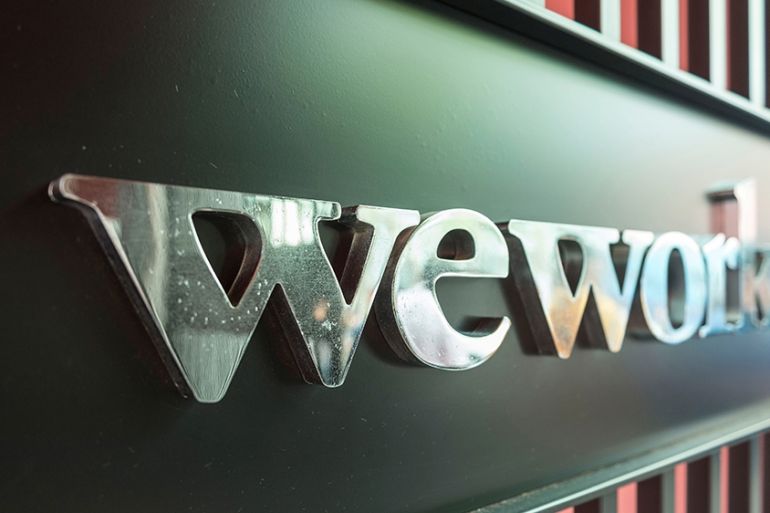WeWork’s IPO plan looks increasingly troubled
The We Company is considering valuation roughly one-third of what the firm was valued at only months ago, sources say.

The We Company, parent of office space provider WeWork, is considering slashing the valuation of its planned market debut to below $20bn, two people familiar with the matter told the Reuters news agency.
The news comes amid reports that the company’s biggest investor has asked it to shelve its plans for the introductory public offering (IPO) due to weak demand.
Keep reading
list of 4 itemsAs US inflation ticks back up, it could impact the presidential election
Will the US unemployment rate continue at historic lows?
The UK’s new minimum wage ‘badly needed’ but many calling for more
Having previously hoped to begin its roadshow pitching the IPO to investors as early as this week, The We Company may now wait until Monday, one source told Reuters.
The valuation for the money-losing United States startup, which is based in New York City, could be as low as $15bn to $18bn, said one of the sources with direct knowledge of the matter.
The other source said that the valuation was unlikely to be that low, yet both cautioned that no final decisions have been made – and the plans for valuation and its timing were all still subject to change.
‘Lower than anticipated’
The We Company was valued at $47bn when its biggest outside shareholder, SoftBank, made a follow-on investment in the property group earlier this year.
But on Monday, the Financial Times reported that SoftBank had urged The We Company to shelve its IPO due to tepid investor demand.
SoftBank and its Saudi-backed Vision Fund have sunk more than $10bn into the company.
Having burned through $2.36bn in cash in the first half of 2019, The We Company requires a fresh injection of cash. SoftBank has so far been reluctant to invest in it further.
Given that reality, The We Company “may have no choice but to push ahead with the IPO at a much lower than anticipated valuation”, one of the sources said, requesting anonymity because the matter is private.
SoftBank declined to comment, and The We Company also declined to comment during the quiet period ahead of the IPO.
In August, The We Company secured $6bn in bank commitments dependent on it raising at least $3bn from the IPO or direct investors such as SoftBank.
The $669bn in junk bonds that The We Company issued last year fell below face value – the amount paid to bondholders at maturity – for the first time since the company announced IPO plans a month ago.
The 7.875 percent note due in May 2025 was down 2.5 cents on the dollar, and the yield surged by 55 basis points to the highest since mid-August.
The We Company’s planned listing follows weak initial trading for other startups, including Uber Technologies Inc and Slack Technologies Inc – both also backed by SoftBank, which is widely seen as having contributed to frothy tech valuations.
While SoftBank and its Vision Fund emphasise their long-term investing credentials, SoftBank founder and CEO Masayoshi Son has set out an ambitious IPO pipeline for tech investments spanning ride-hailing, fintech, and health startups.
Putting The We Company’s offering on hold would disrupt that schedule at a time when SoftBank is seeking funds from investors for a second Vision Fund, for which it says $108bn in pledges have been secured.
SoftBank reluctance
WeWork, which rebranded as The We Company in January, has emerged as one of SoftBank’s biggest bets.
CEO Son, as well as SoftBank Vice Chairman Ron Fisher, was in favour of the IPO until last week, despite others inside the group pushing for a delay, one source said.
However, in recent days, Son and Fisher have now conceded privately that a delay might be in SoftBank’s best interests, the source added. Other sources stressed the situation was still in flux.
Chris Lane, a senior research analyst at Sanford C Bernstein & Co, LLC, said that if WeWork halted its IPO, SoftBank could come up with an alternative funding plan for the startup. Lane estimates that it would need $9bn to become cash-flow positive, so that more money is flowing into the business than going out.
SoftBank has “an important voice, but more importantly, they have money”, he said, adding that The We Company “will have to listen to them”. Lane values the office space-sharing firm at $23bn.
The tech conglomerate has burned through much of the $100bn raised by its first Vision Fund in just two years, recording big paper gains on internal revaluations of its tech investments, as well as the sale of marquee investments including India’s Flipkart, a rival of Amazon Inc.
SoftBank says its valuation techniques include cash-flow analysis, recent transactions, and comparison with peers to underpin its numbers, but Son has won a reputation for intuitive bets and for doubling down on companies that have yet to generate hard results.
At the end of June, the fund recorded the value of $71bn in investments in 83 startups as having grown by $20bn. Since then, the share prices of Uber and Slack have both fallen by around a third.
SoftBank says many investments receive a vote of confidence as third parties come in as coinvestors or by making follow-on investments at the same or higher valuations.
If a tech company shelves an IPO due to a lower valuation than expected, investors are generally expected to take that fall into account when appraising their stakes.